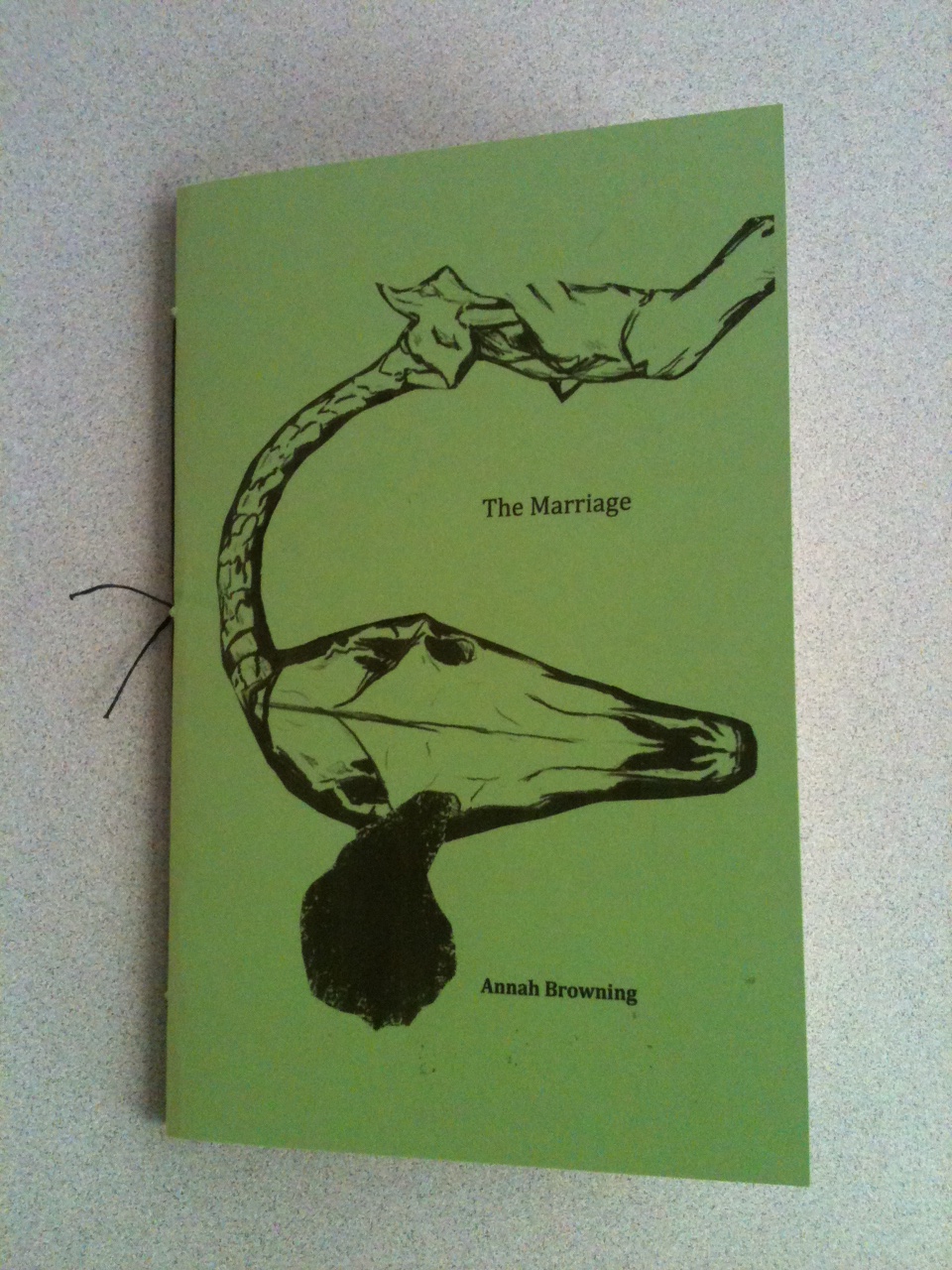|

The Marriage
Annah Browning
Horse Less Press
2013
The Marriage: Until Death (of Metaphor) Do We Part
by Virginia Konchan
Many contemporary poetry collections are apostrophic: hauntologies of a missing person or persons (Matthew Zapruder’s Come On All You Ghosts), or, transcribing a literal loss of the beloved (Marie Howe’s What the Living Do): archaeologies of eviscerated traces, elegiac mourning, and debt.
Yet others mark the space of lived relation: the tug of war with phantoms or souls not physically present, but also voices and beings in present time. Described Browning as an exploration of the damaged psyche of a woman after marriage, and her changing relationship to herself, as inspired by Russian folktales in which “terrible things happen for no good reason in frosty landscapes,” and Shirley Jackson’s unstable narrators, The Marriage is a neo-gothic, adroit and whip-smart exegesis of the shared symbiosis between mind and body, or self and imagined other, in a relation of tenderness (the burden of being other akin to the burden of metaphoric transposition), the willed vulnerability of the speaker of The Marriage in her quest to solidify a love relationship (chemically make solvent, even: a linguistic act rather than state-sponsored contract) is unsettling and heartbreaking.
“Encounter”: “In a halo of sweat,/ I seize one moment after/ the moment . . . Come on, I’m your/ clam shell. I’m your smallest/ palace wife.” From “Fall”: “There./ That does it. You are a tower,/ I am a tower. We’ll plummet,/ but that won’t be dangerous soon.” And in the chapbook’s penultimate poem, “The Creature”: “adjust to this/ climate. Be with me, my long-/ weathering girl.”
At times, this relationship undergoes gentle correctives (the vexed knot of becoming-other without becoming-object). From “The Pet”: “Yes, that’s/ my lap, I’m not a kneeler./ I’m not some hankerchief/ for you to cry in, though of course/ you’re crying now. Pet, pet/ pet. How could I leave you frozen/ when there are so few/ others? How could I turn/ the whistle away, when the wind/ opened up my door?” At still other times, the speaker delights in surrendering to animalist affection. From “Thursday’s Child”: “I put my head in your lap/ and decide to purr.”
Autogenetic and masterful, in these diacritics for and against creation (and love), at times the speaker insists upon her own utility, not as a humanist subject, but Foucaultian biopower (however ironized for Browning, dating back to Don Quixote’s confusion of windmills with giants) itself. Nodding to Sylvia Plath’s “Nick and the Candlestick” is Browning’s “The Winter”: “I am the beast, what lumbers beneath/ me. I am the heat in the barn.”
The Southern-born author of The Marriage deploys regional idioms (“My goodness!”) to suggest a volta from the nihilism of empty signifiers to the succor of valuation and care, in “Flat Hills” “Murderers/ stood on the edge of the deep/ and were lonely. They waved/ all their shovels at me—goodness—/ goodness, I said—it must/ be something like this.”
Anterior, however, to regional topographies of language and economies of relation, and debt, is a deeper, Americanist genealogy marking the failure of progress narratives to account for the destruction of predestined paths, including one’s own mutiny from determinisms (class, gender, biology, history). From “I’ll Open No Other”: “I want/ to imagine you here,/ wet and open, wind and wave./ Shaking your terrible hands . . . Dire horse, dire man./ I fled you, and then you fled.” In newly broken alphabet, the chimerical paths of American idealism and imagination here give way to a post-post-colonial voyage of mind, on a fleet of destiny not manifest (imperialist apologia) but chosen: the choice to surrender seas of potential for land: “The Voyages”: “All trails must/ fail, somehow. You were giving/ up a thought . . . Your captive vision,/ making out the headlines-/ Bloom, Francisco. City, Father. / Blessed Helm.”
---
Virginia Konchan’s poems have appeared in The New Yorker, Best New Poets, The Believer, and The New Republic, her criticism in Workplace: A Journal for Academic Labor, Quarterly Conversation, and Boston Review, her translations in Asymptote, and her fiction in StoryQuarterly and Joyland, among other places.Co-founder of Matter, a journal of poetry and political commentary, and regular contributor to The Conversant, and Jacket2, she lives in Chicago.
Also by Virginia Konchan:
A review of The Other World by Lucy Biederman
A review of Clamor by Elyse Fenton
A review of My Love is a Dead Arctic Explorer by Paige Ackerson-Keily
A review of The Lily Will by Melissa Dickey
A review of It is Daylight by Arda Collins
A review of A Witness in Exile by Brian Spears |
|

